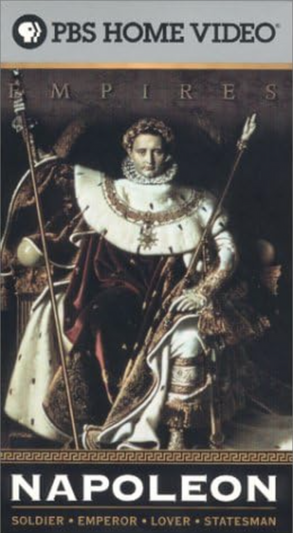Documentary Review: Empires - Napoleon

I really enjoyed the four-part mini-series Empires - Napoleon from PBS (2000). It’s a pretty old documentary mini-series, but it was certainly very interesting. The documentary tells the whole life story of former French Emperor and General Napoleon Bonaparte. Napoleon is an interesting guy and I’ve previously watched two movies on the guy: Napoleon (Ridley Scott; 2023) and Waterloo (Sergei Bondarchuk; 1970). I was not the biggest fan of the Ridley Scott film Napoleon, but Waterloo was an interesting film. I wanted to write a blog for the Napoleon documentary because this was an exceptionally well-made documentary that had some very interesting content.
I’m going to summarize the documentary the best that I can. Born into a modestly noble family on the island of Corsica, Napoleon always saw himself as Corsican and not French. At the age of 9, Napoleon was sent to mainland France for his education, where he was bullied and teased due to speaking French with a Corsican accent. This led him to reading as an escape and an insatiable drive to succeed in life. Napoleon was heavily influenced by the writings of Plutarch, especially the book Plutarch’s Lives, where he read about Alexander the Great and Julius Caesar. After graduating from military school, Napoleon worked his way up to being an Artillery Captain and gained fame at the Siege of Toulon where he led an army to drive out the British from Toulon. From there Napoleon took advantage of the chaos that resulted from the French Revolution and suppressed the 13 Vendémiaire insurrection. This led him to the high command of the French Army in Italy, and the rest was history.
Napoleon won a string of brilliant victories in Italy and thus started the Napoleonic Wars, where France became the dominant European power and coalitions of other European countries tried to stop Napoleon’s meteoric rise. Napoleon was so successful that he crowned himself Emperor of France in 1804. In total during the French Revolution and Napoleonic Wars, seven coalitions of European powers fought wars against France. Napoleon was not involved in the War of the First Coalition. Yet amazingly, Napoleon was victorious over four coalitions and lost to two coalitions (4W-2L); the two losses came when he was much older. Napoleon had a 20 year military career where he fought around 60 wars. His win-loss record was 53W-7L, which is the best in world history. He won famous battles at Austerlitz (many consider this Napoleon’s magnum opus), Jena-Auerstedt, Friedland (during the early Italian campaign), and Marengo. He performed miraculous feats such as invading Egypt like his hero Julius Caesar and crossing the Alps like someone he greatly respected, Hannibal Barca of Carthage. Hannibal first gained fame invading Italy by crossing the Alps during the Second Punic War. However, Napoleon’s downfall was just as swift as his rise to power; after all the success, his ego could not contemplate failure and he started believing he could not lose… fatal mistake. After the War of the Sixth Coalition and his disastrous invasion of Russia, Napoleon was driven to exile on the island of Elba. Napoleon was restless on Elba and desperate to get back to fighting; he snuck off Elba after around 100 days to return to mainland France. There he rallied his troops for one more war, the War of the Seventh Coalition where he was defeated unconditionally at Waterloo. After Waterloo, Napoleon spent the rest of his life in exile on the island of Saint Helena and he died at age 51 due to stomach cancer.
I think Napoleon is both an inspiration and a cautionary tale. The lesson is to be industrious and ambitious, but never make the fatal mistake of thinking that one can never fail. The truth is that having confidence and humility in balance is what makes someone potent. Steering too far one way or the other will bite someone sooner or later. Here are some interesting quotes from the documentary.
Napoleon’s direct quotes referenced in the documentary that I found interesting:
- “They haven’t seen anything yet. In our time, no one has the slightest conception of what is great. It is up to me to give them an example.”
- “From that moment I foresaw what I might be. Already I felt the Earth flee from beneath me, as if I were being carried into the sky.”
- “Great men become great because they have been able to master luck. What the vulgar call luck is a characteristic of genius.”
- “If I have any ambition, it is so natural to me, so intimately linked with my existence that it is like the blood that circulates in my veins.”
- “After making a mistake or suffering a misfortune, the man of genius always gets back on his feet.”
- “Ambition is never content, even at the summit of greatness.”
As said best by one of the historians in the documentary on Napoleon’s mindset: “He attacks everyday. He attacks when it snows, he attacks at night, he attacks when it’s cold. It’s not the way the game is played. He looks for the enemy, fights it, and when they assume that he’s going to stop, he continues. The next day he fights again. It surprises them.” Bold, audacious, and daring. Yet this is what led to his downfall in the end. It’s true: our greatest strength ends up being our greatest weakness if we don’t develop a well-rounded character.